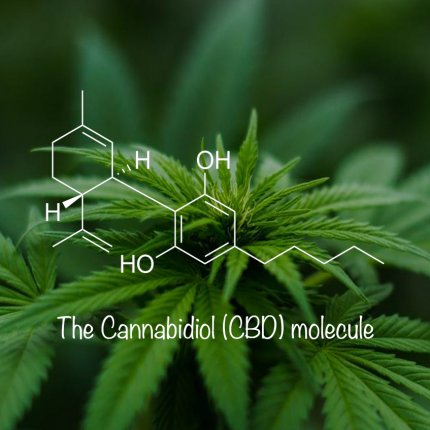 Cannabidiol (CBD) is a naturally occurring compound found in the resinous flower of cannabis, a plant with a rich history as a medicine going back thousands of years. Today the therapeutic properties of CBD are being tested and confirmed by scientists and doctors around the world. A safe, non-addictive substance, CBD is one of more than a hundred “phytocannabinoids,” which are unique to cannabis and endow the plant with its robust therapeutic profile.
CBD is closely related to another important medicinally active phytocannabinoid: tetrahydrocannabinol (THC), the compound that causes the high that cannabis is famous for. These are the two components of cannabis that have been most studied by scientists.
Cannabidiol (CBD) is a naturally occurring compound found in the resinous flower of cannabis, a plant with a rich history as a medicine going back thousands of years. Today the therapeutic properties of CBD are being tested and confirmed by scientists and doctors around the world. A safe, non-addictive substance, CBD is one of more than a hundred “phytocannabinoids,” which are unique to cannabis and endow the plant with its robust therapeutic profile.
CBD is closely related to another important medicinally active phytocannabinoid: tetrahydrocannabinol (THC), the compound that causes the high that cannabis is famous for. These are the two components of cannabis that have been most studied by scientists.
Both CBD and THC have significant therapeutic attributes. But unlike THC, CBD does not make a person feel “stoned” or intoxicated. That’s because CBD and THC act in different ways on different receptors in the brain and body. CBD can actually lessen or neutralize the psychoactive effects of THC, depending on how much of each compound is consumed. Many people want the health benefits of cannabis without the high – or with less of a high.
The fact that CBD is therapeutically potent as well as non-intoxicating, and easy to take as a CBD oil, makes it an appealing treatment option for those who are cautious about trying cannabis for the first time.
Many people are seeking alternatives to pharmaceuticals with harsh side effects – medicine more in synch with natural processes. By tapping into how we function biologically on a deep level, CBD can provide relief for chronic pain, anxiety, inflammation, depression and many other conditions.
Extensive scientific research, much of it sponsored by the U.S. government, and mounting anecdotal accounts from patients and physicians highlight CBD’s potential as a treatment for a wide range of maladies, including (but not limited to):
- Autoimmune diseases (inflammation, rheumatoid arthritis)
- Neurological conditions (Alzheimer’s, dementia, Parkinson’s, multiple sclerosis, epilepsy, Huntington’s chorea, stroke, traumatic brain injury)
- Metabolic syndrome (diabetes, obesity)
- Neuropsychiatric illness (autism, ADHD, PTSD, alcoholism)
- Gut disorders (colitis, Crohn’s)
- Cardiovascular dysfunction (atherosclerosis, arrhythmia)
- Skin disease (acne, dermatitis, psoriasis)
CBD has proven neuroprotective effects and its anti-cancer properties are being investigated at several academic research centers in the United States and elsewhere. A 2010 brain cancer study by California scientists found that CBD “enhances the inhibitory effects of THC on human glioblastoma cell proliferation and survival.” This means that CBD makes THC even more potent as an anticancer substance.
CBD and THC interact with our bodies in a variety of ways. One of the main ways they impact us is by mimicking and augmenting the effects of the compounds in our bodies called “endogenous cannabinoids” - so named because of their similarity to the compounds found in the cannabis plant. These “endocannabinoids” are part of a regulatory system called the “endocannabinoid system”.
The discovery of the endocannabinoid system has significantly advanced our understanding of health and disease. It has major implications for nearly every area of medical science and helps to explain how and why CBD and THC are such versatile compounds – and why cannabis is such a widely consumed mood-altering plant, despite its illegal status.
There’s a lot of excitement about the healing potential of CBD – with good reason.
But it wasn’t until June 25, 2018, that the U.S. Food and Drug Administration recognized cannabidiol as a real medicine by approving Epidiolex, an almost pure pharmaceutical CBD formulation, as a treatment for two severe pediatric seizure disorders, Lennox-Gastaut syndrome and Dravet syndrome.
This was the first time since the peak of the reefer madness era 80 years ago – when “marihuana” became a crime instead of a cure — that the federal government had given an official thumbs-up for a cannabis-derived product.
In response to the FDA’s historic decision, the Drug Enforcement Administration announced in September 2018 that it had removed Epidiolex from Schedule I classification, a category reserved for dangerous drugs with no medical value. Henceforth, Epidiolex would be considered a Schedule V drug, the least dangerous designation under the Controlled Substances Act.
But the DEA kept cannabis and CBD itself on Schedule I as an illegal narcotic. In the world according to Uncle Sam, pharmaceutical CBD is officially the only good cannabinoid while the rest of the plant remains an ‘evil’ weed.
Given CBD’s reputation as a popular, artisanal remedy, one would think that Epidiolex would command a lot of “off label” attention. After all, physicians often prescribe pharmaceuticals off label to treat conditions that were not the actual focus of clinical trials. But the costly price tag for Epidiolex (more than $30,000 annually) precludes off label prescribing as well as affordable access for tens of millions of Americans without health insurance.
Source:
https://www.projectcbd.org/about/what-is-cbd